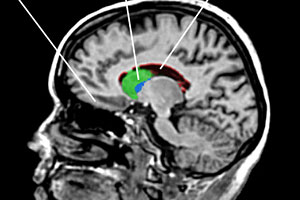This radio story tries to cram a lot into five minutes, so if you don't find what you need here, put a comment on the blog, below and I'll see if I can't provide a lead to more information.
Transcranial magnetic stimulation interested me, in part, because of how non-invasive it is. Dr. Bret Schneider, who offers TMS from his private practice in Portola Valley, was one of several experts to suggest that TMS machines might one day be available for home use. Of course, that's a long way off. TMS is expensive: about $5,000 for an initial round of treatment. It's still much easier and cheaper to simply pop a pill each morning. And researchers are still working out how effective it can be.
Studies show that TMS brings a remission in depression to about a third of patients to try it. Another third experience some improvement, and a final third are unaffected. Dr. Schneider says he sees much better success rates on patients who combine TMS with antidepressant drugs (TMS without drugs, he says, is like "trying to drive a car with no gas.") Finally, the FDA approval covers only one TMS machine on the market, Neurostar, although some physicians use other techniques, off-label.
You can find links to the abstracts of clinical studies performed on TMS and depression through a search at pubmed.com. This meta-analysis compares 30 double-blind studies, covering a total of 1164 patients (606 received TMS, 558 received sham treatments).

